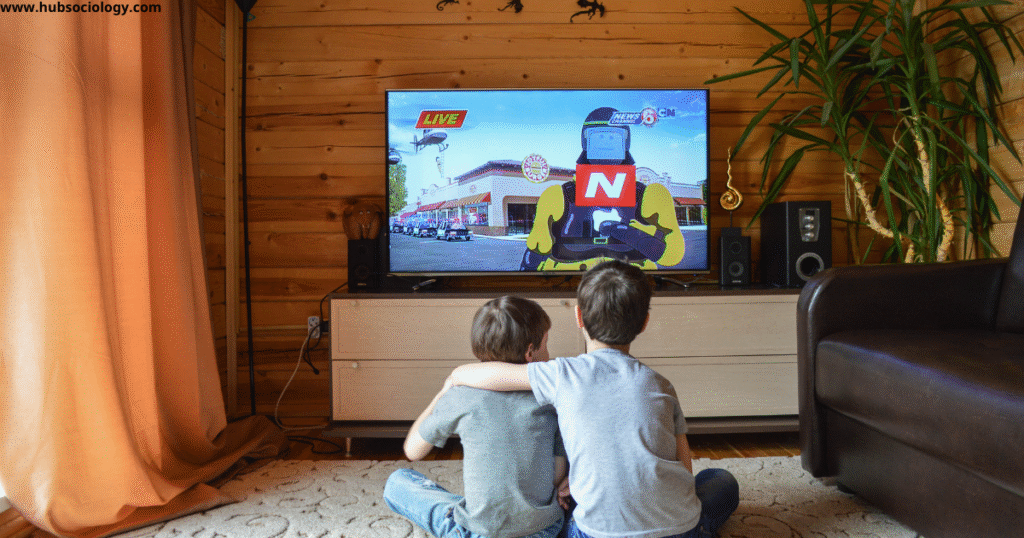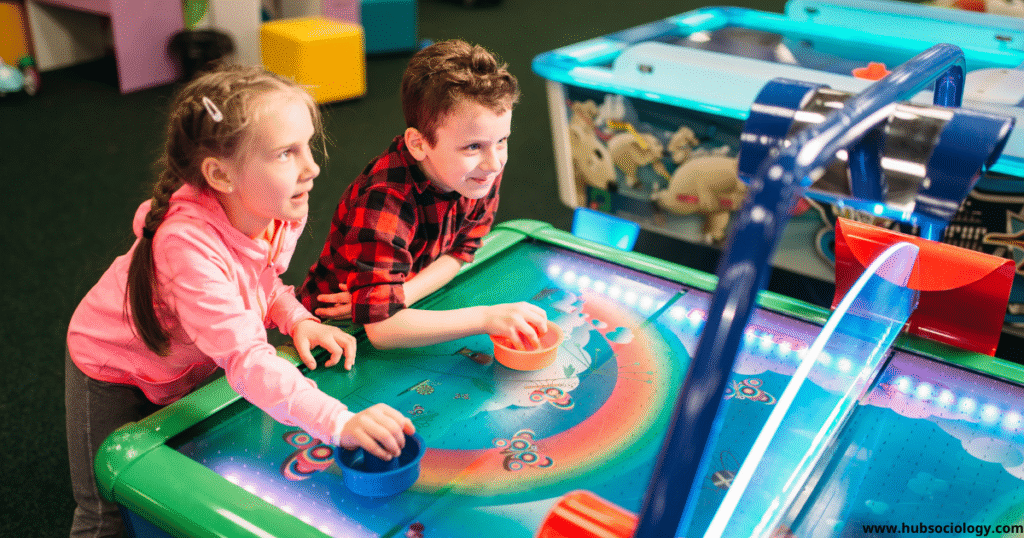Introduction

Entertainment plays a crucial role in shaping the social, cultural, and psychological development of children. In contemporary society, children are exposed to various forms of entertainment, including television, video games, social media, movies, and music. From a sociological perspective, entertainment is not merely a source of leisure but also a powerful agent of socialization that influences children’s values, behaviors, and perceptions of the world.
This article examines the sociological impact of entertainment on children by analyzing its role in socialization, cultural transmission, identity formation, and behavioral influence. It also explores the potential negative consequences, such as exposure to violence, consumerism, and gender stereotypes. By understanding these dynamics, sociologists and educators can better assess how entertainment shapes childhood experiences in modern society.
Entertainment as a Socializing Agent
1. Socialization Through Media
Socialization is a process by which individuals learn the their norms, customs, values, and behaviors of their own society. While family and education are primary agents of socialization, entertainment media has become an increasingly influential force.
- Television and Cartoons: Children’s programs often reinforce societal norms, teaching concepts like cooperation, fairness, and morality. However, they may also perpetuate stereotypes (e.g., gender roles, racial biases).
- Video Games: Interactive games can enhance problem-solving skills but may also normalize aggression if they contain violent content.
- Social Media: Platforms like YouTube and TikTok introduce children to peer culture, trends, and social interactions, shaping their communication styles and self-perception.
2. Cultural Transmission
Entertainment serves as a medium for cultural transmission, exposing children to different traditions, languages, and lifestyles.
- Globalization of Media: Children today consume content from various cultures, leading to a more cosmopolitan worldview. However, this can also result in cultural homogenization, where local traditions are overshadowed by dominant (often Western) media.
- Representation Matters: The portrayal of diverse characters in entertainment helps children develop inclusive attitudes.
Entertainment and Identity Formation

1. Role Models and Celebrity Influence
Children often idolize celebrities, fictional characters, or social media influencers, adopting their behaviors, fashion, and attitudes.
- Positive Role Models: Inspirational figures in media (e.g., scientists, activists, athletes) can motivate children to pursue education and social causes.
- Negative Influences: Glamorization of risky behaviors (e.g., substance abuse, reckless stunts) can lead to imitation.
2. Gender and Racial Identity
Entertainment shapes how children perceive gender roles and racial identities.
- Gender Stereotypes: Many cartoons and movies depict traditional gender roles (e.g., boys as adventurous, girls as nurturing). Progressive media, however, challenges these norms by presenting strong, independent female characters and emotionally expressive male characters.
- Racial and Ethnic Representation: Exposure to diverse characters fosters inclusivity, while stereotypical portrayals (e.g., villains of a particular race) can instill biases.
Behavioral and Psychological Effects
1. Aggression and Violence
Research in sociology and psychology highlights the correlation between violent entertainment and aggressive behavior in children.
- Cultivation Theory (Gerbner): Prolonged exposure to violent media can desensitize children to real-world violence, making aggression seem normal.
- Social Learning Theory (Bandura): Children imitate behaviors they observe, meaning violent video games or movies can encourage physical or verbal aggression.
2. Consumerism and Materialism
Entertainment media often promotes consumer culture, influencing children’s desires and spending habits.
- Advertising and Product Placement: Cartoons and YouTube videos frequently feature branded products, encouraging materialism.
- Influencer Marketing: Social media influencers endorse products, leading children to associate happiness with consumption.
3. Mental Health Implications
Excessive screen time and certain types of entertainment can affect children’s mental well-being.
- Social Media Anxiety: Constant comparison with idealized online personas can lead to low self-esteem and anxiety.
- Addiction to Digital Entertainment: Overuse of video games or streaming platforms can reduce physical activity and social interactions.
Parental and Societal Regulation
Given entertainment’s profound impact, parents and policymakers play a role in mediating its effects.
1. Parental Mediation Strategies
- Co-Viewing: Watching programs with children allows parents to discuss themes and correct misconceptions.
- Content Filtering: Using parental controls to limit exposure to inappropriate content.
- Encouraging Critical Media Literacy: Teaching children to analyze media messages rather than passively consuming them.
2. Policy and Industry Responsibility
- Content Regulations: Governments enforce ratings (e.g., PG, TV-14) to restrict children’s access to violent or explicit material.
- Ethical Media Production: Encouraging creators to produce educational, diverse, and socially responsible content.
Conclusion
Entertainment is a double-edged sword in children’s socialization. While it fosters creativity, cultural awareness, and learning, it also poses risks such as promoting violence, consumerism, and unrealistic body standards. From a sociological standpoint, understanding these influences allows for better strategies to maximize benefits while minimizing harm.

Parents, educators, and media producers must collaborate to ensure that entertainment serves as a positive force in children’s development. By promoting critical engagement with media and advocating for responsible content, society can help children navigate the complex world of enter-tainment in a way that enriches rather than diminishes their social and psychological well-being.
Key Takeaways for Sociology Students
- Entertainment is a major agent of socialization alongside family and school.
- Media influences identity formation, cultural perceptions, and behavior.
- Violent and commercialized content can negatively impact children.
- Parental guidance and media literacy are crucial in mitigating adverse effects.
Topic Related Questions
5-Mark Questions (Short Answer)
- Define the role of entertainment as an agent of socialization in children’s lives.
- Explain how cartoons and TV shows contribute to gender socialization in children.
- What is Cultivation Theory, and how does it relate to children’s exposure to violent media?
- List three ways social media influences children’s self-perception and behavior.
- How does entertainment media contribute to cultural transmission in society?
10-Mark Questions (Brief Essay/Detailed Explanation)
- Discuss the impact of violent video games on children’s behavior using Social Learning Theory (Bandura).
- Analyze how media representation (race, gender, class) shapes children’s understanding of social identities.
- Examine the role of celebrity culture in influencing children’s aspirations and behaviors.
- Evaluate the positive and negative effects of children’s exposure to consumerist messages in entertainment.
- How can parents mediate the effects of digital entertainment on children? Provide sociological strategies.
15-Mark Questions (Long Essay/Critical Analysis)
- Critically assess the statement: “Entertainment media does more harm than good in the socialization of children.” Support your answer with sociological theories and examples.
- “Children today are more influenced by social media than by their families.” Discuss this argument using relevant sociological perspectives.
- Compare and contrast the role of traditional entertainment (e.g., books, folklore) and modern digital entertainment (e.g., YouTube, video games) in child socialization.
- How does globalization of media impact children’s cultural identity? Discuss with examples.
- “Media literacy is the solution to reducing negative enter-tainment influences on children.” Do you agree? Justify your stance with sociological evidence.

1 thought on “Entertainment and Its Sociological Impact on Children”